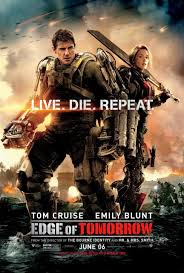 I, for one, am glad to see Tom Cruise settling into the science fiction genre. With Oblivion and now Edge of Tomorrow, he has moved up my list. Unfortunately, it appears that movie goers either don’t trust Cruise anymore, or they simply aren’t interested in quality science fiction thrillers not titled Matrix.
I, for one, am glad to see Tom Cruise settling into the science fiction genre. With Oblivion and now Edge of Tomorrow, he has moved up my list. Unfortunately, it appears that movie goers either don’t trust Cruise anymore, or they simply aren’t interested in quality science fiction thrillers not titled Matrix.
While Edge of Tomorrow hasn’t done well at the box office, it seems to be generating positive reviews. And I liked the movie. I didn’t like it quite as much as Oblivion. The key reason is the ending. No worries, no spoilers here. But the ending just didn’t work for me–not for this movie. For a simpler one, sure.
But it wasn’t so disappointing as to ruin the entire movie.
Cruise and his supporting actress, Emily Blunt, were both excellently cast and made the most of their parts. The Groundhog style time loop plot device worked for me. What makes the technique really work is the fact Cruise starts off as completely incapable of fighting. He describes himself in the movie as an ROTC student in college who lost his job and took a new one as a military recruiter. He’s a smooth talker who finds himself on the tip of the spear for reasons the film viewer is to assume revolve around politics and a scramble to cover asses.
While the reasoning isn’t totally clear, it sets up the main device of the movie–Cruise’s character replaying the same day over and over. Since he starts off as unskilled, it gives him all the more space to improve and mature and grow as a hero. His first several loops, he dies as an incompetent boob. Midway through the movie he is dying heroically, repeatedly. The contrast is what sells the device.
And I’ll give the director and writer credit. Killing the main character over two dozen times in a movie can’t be an easy thing to pull of well. Each death has to ratchet up the urgency of the plot, or the deaths are going to get tedious. If the loop is progressing the whole device unravels. This is executed masterfully. And at times, even comically.
Even the method of getting out of the loop works fairly well. The explanation is a bit sketchy, but at least the film offers one with some scientific backing. Up to the very end, the only complaint I have is not seeing enough battle scenes against the alien enemy–the Mimics. But it is likely more would have been annoying to certain viewers. The nasty things are so brutally effective and quick that the battle scenes necessarily end decisively end in a matter of seconds.
Settling with these brief fight scenes is certainly a better option than going Iron Man III and trying to convince audiences that the human/mech warriors are able to stand up to infinite abuse.
Overall, director Doug Liman had his best showing since The Bourne Identity. And I’m grateful for both The Edge of Tomorrow and Oblivion for upping the main stream film bar for intelligent science fiction. (Oh, and I love the tag line.)